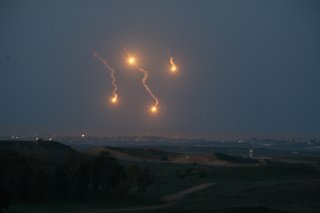Israel’s Proportional and Humanitarian Response
Contrary to breathless media reports, Israel’s military conduct has not embraced the collective punishment of Palestinians.
Hamas murdered over 1,400 Israelis on October 7 in the deadliest attack on the Jewish people since the Holocaust. As Israel prepares to launch widespread ground-based counterterrorism missions in the coming days, there is a growing chorus arguing that Israel is responding disproportionately to the terror attacks, launching indiscriminate attacks on Gaza, and engaging in collective punishment. Misconceptions surrounding these three issues are driving this anti-Israel sentiment.
Hamas’ horrific attacks continue to this day. The terrorist group is firing rockets indiscriminately at Israeli population centers on a daily basis. A cursory look at a map of air-raid warnings in Tel Aviv poses an interesting question that critics of Israel seldom think about: what is the ethical and proportional response to indiscriminate rocket attacks on a civilian population by a terrorist entity?
Proportionality does not mean an eye for an eye or that there should be a balance of blood between Israelis and Palestinians. Hamas gunning down Israelis at a music festival does not give Israel a license to do the same to Palestinians. Instead, proportionality requires belligerents to weigh the expected military advantage derived from an action against the possible harm done to civilians.
Perhaps the most prominent example of Israel’s supposed use of disproportionate force relates to the explosion at Al-Ahli Hospital in Gaza on October 17. According to initial reports, an Israeli air strike on the hospital killed hundreds of people. What military advantage could justify such a horrific attack? Many news outlets in the region hailed this as proof of Israel’s merciless use of military power to kill innocent civilians in a hospital. Approximately forty-eight hours after the incident, as U.S. intelligence assessments (in conjunction with Israeli sources) concluded the strike was likely the result of an errant Palestinian Islamic Jihad rocket, the same Western outlets that initially blamed Israel began retracting their claims. Though many of the outlets had relied on the Gaza Health Ministry for their information, only some of them conveyed that Hamas runs the ministry. Relying on the terrorist group as a source of data was a grotesque abandonment of journalistic principles, to say the least.
For anti-Israel activists, the widespread damage to civilian infrastructure in Gaza, including the attack on the hospital, serves as proof that Israel is attacking Gaza indiscriminately. This is erroneous for two main reasons. First, this claim requires knowledge of the intentions of the Israeli commanders ordering the strikes and the soldiers carrying them out. Second, Hamas’ cynical use of human shields forces Israel to choose between leaving its civilians undefended and risking Palestinian civilian casualties. Without knowing the objectives of each Israeli strike and the Hamas assets embedded within civilian areas, there is no basis for claiming that Israel is attacking Gaza indiscriminately.
The same crowd crowing about disproportionate and indiscriminate force is also accusing Israel of engaging in collective punishment. Israel has evacuated its civilians along the Gaza border and warned Palestinians to do the same in northern Gaza. When Israel warns of impending attacks, Hamas has actively prevented Palestinians from fleeing those areas. Somehow, Israel’s efforts to minimize civilian casualties are a form of forced displacement and collective punishment.
Critics have attacked Israel’s humanitarian gesture without providing a practical alternative. An immediate ceasefire leaving Hamas intact is obviously a non-starter. But sending Gazans elsewhere is also impractical. No country is willing to take in Palestinians en masse, either for fear that they would be a destabilizing force or, ostensibly because this would aid in their permanent dispossession from Gaza. Israel cannot accept Gazans into its territory without possibly bringing in Hamas fighters disguised as civilians or civilians who would gladly join in the massacre of Israelis, as we saw on October 7.
Israel has also been accused of withholding the flow of vital aid such as medical supplies, water, fuel, and food into Gaza. This has been partially resolved following President Biden’s visit to Israel. Now, twenty trucks of aid will flow into Gaza as an experiment. But Hamas will likely seize some or all of the aid intended for civilians to support its war efforts. For example, a week into the war, the UN refugee agency dedicated to the Palestinians, UNRWA, posted on X that Hamas had stolen supplies from an UNRWA facility. UNRWA later deleted the post, which is common practice among groups subject to Hamas’ intimidation.
In the days to come, Israel will likely launch its ground offensive. Palestinian civilian casualties are the inevitable result of Hamas’ attacks on Israeli civilians and the use of Palestinian civilians as human shields. False narratives and failing journalistic standards will aid claims of disproportionate and indiscriminate Israeli attacks and collective punishment. Rather than agitating for peace, those pushing these narratives are providing cover for Hamas to launch future attacks against Israeli civilians.
Sinan Ciddi is a non-resident senior fellow at the Foundation for Defense of Democracies (FDD), where he contributes to FDD’s Turkey Program and Center on Military and Political Power (CMPP). He is also an Associate Professor of Security Studies at the Command and Staff College-Marine Corps University and Georgetown University’s School of Foreign Service.
David May is a research manager and senior research analyst at FDD. FDD is a Washington, DC-based, nonpartisan research institute focusing on national security and foreign policy.
Image: Shutterstock.

